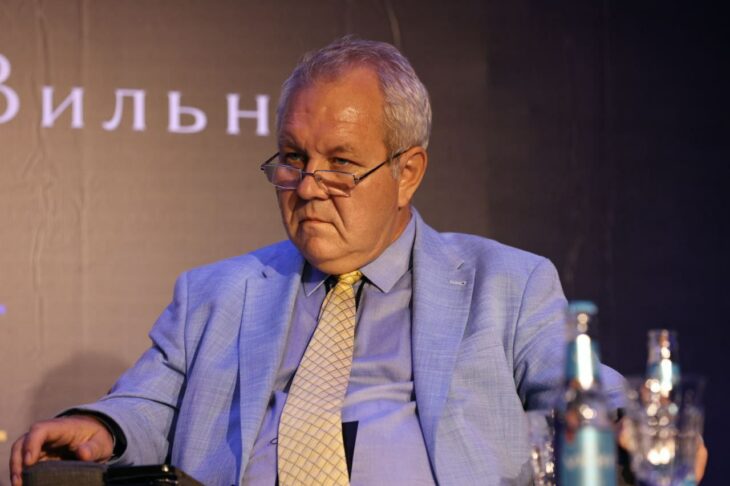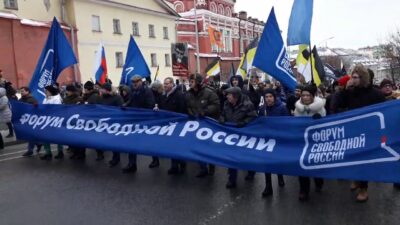
Speech at the Congress of Free Russia, Vilnius, September 1, 2022
The disaster really happened. This is a very big disaster. In no case would I say that this is the problem of one of the failed mobilizations. This is a catastrophe for Russia on an absolutely universal scale, because for many hundreds of years Russia has developed exclusively not in a national, but in a purely imperial form, it followed very small and short exceptions from one expansion to another and its significance in world history grew steadily until the victory in World War II and the successes of the following decades. What happened from the 70s and continues until today is a complete reversal of this whole trend, which, of course, caused enormous moral, intellectual, and psychological changes in a society that, as such, did not exist. No other nation, with the possible exception of Germany after the First World War did not experience such a shock as the Russian Federation, the Russian people, and the population experienced after 1991.
Not a single European empire has gone through such a breakdown for one simple reason: in any European empire, the center was a clearly understood national state that had developed before the start of imperial expansion, which was not the case in Russia. In this respect, Russia is similar to Germany, which, in fact, only at the end of the 19th century formed from a huge number of German principalities, and then suffered a terrible defeat in the First World War. Therefore, our catastrophe and our situation is the catastrophe of Germany in 1918 and the situation of German society in 1939-40. That is, we are on the eve of even greater problems. This is not 1945. This is not denazification at all, these are just approaches to the biggest crimes of Russia and which it will do in the coming years, after which, perhaps, a reverse trend will begin. Therefore, we have hard times ahead of us, and I would emphasize that, by saying that our emigration can change a lot, let’s look at the German migration of the late 1930s, and what it changed — we will see basically nothing.
In this case, I really think that any post-imperial syndrome is a very severe syndrome. Even in European countries, more successful than ours, it was serious — it was in the UK, in France, in Portugal. In fact, the European Union is actually the perfect cure for imperial syndrome. The empire created from the former metropolitan powers, the unification of the former metropolitan powers greatly reduced the pain of imperial problems. If Russia had been accepted into this European family as a former metropolitan power during the time of Mikhail Sergeyevich Gorbachev, perhaps there would have been no such breakdown and it would have passed easier. But this did not happen for other reasons, which we will not discuss now.
The second point that has already been noticed is the question about the “deep people” and the fear of this “deep people”. I believe that this fear stems from the same imperial paradigm, because in an empire there is neither a people nor a society. There are subjects that, of course, any imperial administration is afraid of. Both the Soviet and the new Russian elite were absolutely centralized imperial elite, which were afraid of the people. This was seen in many historical turning points. In this case, the only person who was not afraid of the people was just Mikhail Sergeevich, because it was under him that these were the only three cases of free elections in 1989, 1990 and 1991 that took place in the USSR, when the real communist elite ceded power to the new elites. As soon as this process was over, Russia came back again. The brake did not happen in 1999, it happened in 1996 because it was the first example of undemocratic elections, it also happened in 1993 when the Constitution was adopted that destroyed the 1992 Federal Treaty and from the emergence of new Russia the path to Putinism was direct and clear, in my opinion. Until we recognize this, we will not soon come to understand who we are, because many of those gathered here have also paved the way along this path.
In this case, it seems to me that a disaster has happened. Russia did not survive the loss of its imperial greatness. It is for that reason that the “deep” and “non-deep” people are fighting in Ukraine now. It will be many years before this process is completed, and indeed, military defeat is certainly necessary as an essential element in bringing a nation to its senses. Nothing will happen without it. This is the logic of post-imperial transit.
Moreover, if we look at the situation that was after the war in Germany, then the question is not even denazification, the question is different — after the First World War, all European politicians who gathered in Versailles were sure that they were building a new ideal world with the League of Nations, with the triumph of law, Germany will no longer be an empire, it will be a democratic state, and so on. These people were very great and sincere. The same were the Western politicians who, together with Gorbachev, did Perestroika in the 1990s, when Russia was really perceived as a normal country, which, through economic success, generational shifts, new people, the development of education, people’s awareness of the new reality, travel to the West, retraction in Western reality will become an absolutely equal member of the international community. This did not happen. After the Second World War, the West turned out to be taught lessons and it did not just denazify Germany, but firmly included it in the institutions of NATO, the European Union and many other structures within which it developed in the space of freedom that was given to it, and this led to tremendous success and the result when Germany became the most pacifist country in Europe and the most powerful democratic member of the European Union. Therefore, not just a military defeat of Russia in the war with Ukraine, but the subsequent integration of Russia into Western structures is the only chance for this country to become normal.
Just as German resistance would not change German society, so our opposition will not rebuild Russia. Inside the country, there are much more complex and neglected processes. Putin did not change the country, on the contrary, he allowed it to become itself. Gorbachev tried to bring ideas to Russia that were unusual for it. Putin did not try to do anything like that, he tried to understand what points in Russia could be put under pressure so that the people would become an obedient mass, and he found these points that were laid down and put pressure on them. He did not invent them, he did not educate anyone, he did not raise the people to the level of an enlightened ruler, he descended to the level of the majority of the population, and this means that it is impossible to solve this paradigm exclusively within. Therefore, I think that the path to the normalization of Russia will be very long, it will pass through a military defeat, through a consensus with other international players, an understanding of what Russia can achieve over the next few decades and the development of a paradigm for this movement.
In conclusion, I want to say that I absolutely agree that Russia’s big problem is that no one had a program for its reforms and transformations. This program will not be born within Russia itself. In the same way that the German development program was not born among a few pacifists and the Japanese development program was not born among a few samurai who did not want war in 1941, so this program will only be born in the cooperation of the progressive part of Russian society and the European institutions that can offer not only the program itself, but also the method of its implementation. Unfortunately, I do not believe that any Russian opposition will not repeat the path of the 1991 opposition, which considered only itself as democratic and only its own path as the right one. Russia is a country of personalistic power, not the rule of law. The rule of law today is embodied in Western institutions and, in particular, European institutions. Therefore, Russia can be free and successful only if it says goodbye to the empire, recognizes the absolute right of all its former satellites and all its former colonies to free development and goes into apprenticeship to European structures and institutions. Only in this case European Russian society can become normal. If Russia tries to go to Asia, it will be an even more terrible journey because it will be an attempt to impose even more alien values on Russian society and there we will get even more problems.
The disaster has happened. We’ve gone the wrong way, we’re not ready to turn back now. For this to happen, more political disasters and military disasters for Russia would have to happen. When they happen, there will be a window of opportunity. How it will be used is a question not only for us, but also for those countries that must understand that to have Russia on their borders, not included in their own security structure, means never to be in peace and tranquility.




